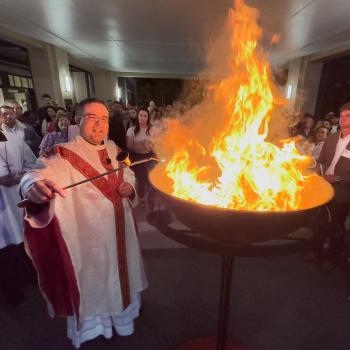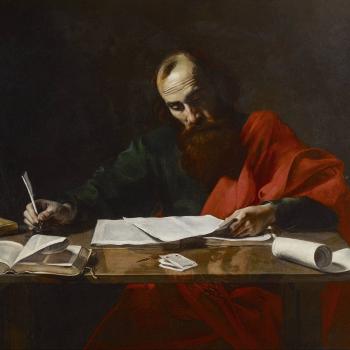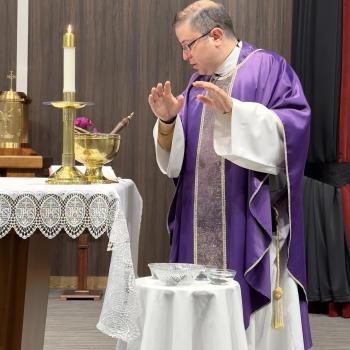On a day like today in 1980, Archbishop Romero of San Salvador was celebrating Mass at the chapel of the hospital where he lived. After preaching, the archbishop moved towards the center of the sanctuary to prepare the altar, he no longer allowed others to help him at the altar for fear of his future murderer accidentally shooting the wrong person. From the back seat of a car that had parked at the door of the church while the driver pretended to check on the tires, a sharpshooter shot Archbishop Romero right in the heart. He collapsed and died instantly. Women soaked up his blood with their veils and handkerchiefs. Listen to Romero preaching, the shot and the people’s reaction by clicking here.
Romero’s alb with blood
A few days later, moments before his funeral Mass began at the main square of the city, the same government that ordered the archbishop’s death began shooting at the assembled crowd. Forty people died at the square which quickly turned into a war zone as many dropped dead and injured while running towards the inside of the cathedral for refuge.
The archbishop’s vicar general, Monsignor Urioste (pictured below), tells that Romero feared a violent death, yet he persevered preaching the Gospel in a country at war. He stood up against a government that oppressed its people and killed thousands of innocent civilians. Monsignor Urioste states that Archbishop Romero often said it was difficult to be a ‘man of the magisterium’ because it was not easy to be always consistent in the proclamation of the Gospel. Romero firmly believed he had to accept and live out the wholeness of the teachings of the Church, including standing up against oppression and injustice.
Romero was a simple man in love with the people he served. He’d often say to his flock, “it is easy to be the pastor of a people like you.” He was painted by his government as a communist. Leftist rebels perceived him as a traitor because he would not go along with them. Even John Paul II became suspicious of his work and words, so he called Romero to Rome to explain himself, but John Paul II eventually supported Romero without reserve. In 1983 John Paul visited Romero’s tomb despite opposition from the Salvadorian government and high ranking church officials. The Pope described Romero as “a zealous and venerated pastor who tried to stop violence. I ask that his memory be always respected, and let no ideological interest try to distort his sacrifice as a pastor given over to his flock.”
The Sunday before his death, Romero preached his death sentence at Mass in the cathedral. He made a direct appeal to soldiers to stop the killing their own people. He knew it was dangerous because the government could accuse him of treason. For the government and military, Romero had gone too far. Here are his last public (and very passionate) words from the very end of his homily:
“I would like to make a special appeal to the men of the army, and specifically to the ranks of the National Guard, the police and the military. Brothers, you come from our own people. You are killing your own brother peasants when any human order to kill must be subordinate to the law of God which says, “Thou shalt not kill.” No soldier is obliged to obey an order contrary to the law of God. No one has to obey an immoral law. It is high time you recovered your consciences and obeyed your consciences rather than a sinful order. The church, the defender of the rights of God, of the law of God, of human dignity, of the person, cannot remain silent before such an abomination.
“We want the government to face the fact that reforms are valueless if they are to be carried out at the cost of so much blood. In the name of God, in the name of this suffering people whose cries rise to heaven more loudly each day, I implore you, I beg you, I order you in the name of God: stop the repression. [to hear Romero say this line on recordings gives you goose bumps]
“The church preaches your liberation just as we have studied it in just as we have studied it in the holy Bible today. It is a liberation that has, above all else, respect for the dignity of the person, hope for humanity’s common good, and the transcendence that looks before all to God and only from God derives its hope and its strength.”
Servant of God Oscar Romero, pray for us!
Archbishop Romero’s simple room at the Divina Providencia Hospital
The archbishop’s typewriter and tape recorder where he recorded his audio diary
Archbishop Romero’s tomb at the cathedral of San Salvador
Archbishop Romero’s name on the wall with names of the 75,000 civilians killed during the war in El Salvador
Pictures are mine, all rights reserved.
















